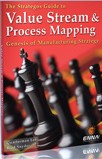|

The free newsletter of Lean Manufacturing Strategy
Lean Briefing Archives

Books & Videos

The Strategos Guide To Value Stream and Process Mapping goes far beyond symbols and arrows. In over 163 pages it tells the reader not only how to do it but what to do with it.
More info...
Strategos Guide to Value Stream & Process Mapping
Also...
Guide to Cycle Counting
Facilities & Workplace Design
Warehouse Planning Guide
Human Side of Lean Video


|
 |
Deming's 14 Points
Key Principles for Business Transformation
|
|


 William
Edwards Deming William
Edwards Deming
(October 14, 1900 – December 20, 1993)
Was an American statistician, professor, author, lecturer, and consultant best known for his work in Japan. Deming made a significant contribution
to Japan's later reputation for innovative high-quality products. He is regarded as
having had more impact upon Japanese manufacturing and business than any other individual not of Japanese heritage.
Despite being a hero in Japan, he was only just beginning to
win widespread recognition in the U.S. at the time of his death.


|
-
Create constancy of purpose for
the improvement of product and service, with the aim to become competitive, stay in
business, and provide jobs.
-
Adopt a new philosophy of cooperation
(win-win) in which everybody wins and put it into practice by teaching it to employees,
customers and suppliers.
-
Cease dependence on mass inspection to achieve quality. Instead,
improve the process and build quality into the product in
the first place.
-
End the practice of awarding business on the basis of
price tag alone. Instead, minimize total cost in the long
run. Move toward a single supplier for any one item, based on a long-term relationship of
loyalty and trust.
-
Improve constantly, and forever,
the system of production, service, planning, of any activity. This will improve quality and
productivity and thus constantly decrease costs.
-
Institute training for skills.
-
Adopt and institute leadership for the
management of people, recognizing their different abilities, capabilities, and
aspiration. The aim of leadership should be to help people, machines, and gadgets do a
better job. Leadership of management is in need of overhaul, as well as leadership of
production workers.
-
Drive out fear and build trust so
that everyone can work more effectively.
-
Break down barriers between departments.
Abolish competition and build a win-win system of cooperation within the organization.
People in research, design, sales, and production must work as a team to foresee problems of
production and use that might be encountered with the product or service.
-
Eliminate slogans, exhortations, and
targets asking for zero defects or new levels of productivity. Such exhortations only
create adversarial relationships, as the bulk of the causes of low quality and low
productivity belong to the system and thus lie beyond the power of the work force.
-
Eliminate numerical goals,
numerical quotas and management by objectives. Substitute leadership.
-
Remove barriers that rob people of joy in
their work. This will mean abolishing the annual rating or merit system that ranks
people and creates competition and conflict.
-
Institute a vigorous program of education
and self-improvement.
-
Put everybody in the company to work to accomplish the
transformation. The transformation is everybody's job.
|
|
|





